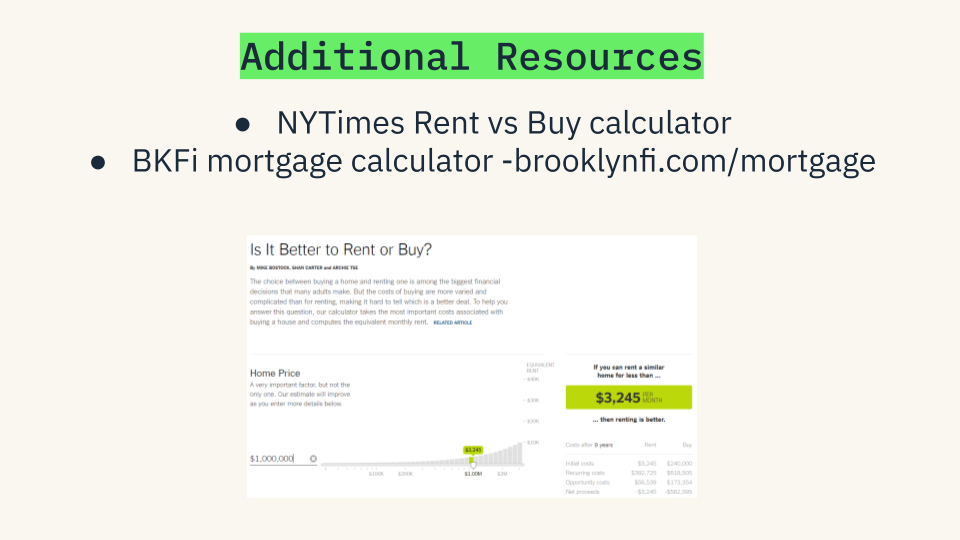Renting vs Buying Your Home: The Ultimate Showdown
This is the 4th iteration of this popular webinar, and was hosted by AJ Ayers and John Owens, of Brooklyn Fi. They took on the age-old question: Is it better to rent or buy a home? These are the takeaways, as well as some resources to help you in your decision-making process.
Key Timestamps:
NYC: A Real Estate Rollercoaster of a Case Study (03:45)
The Interest Rate Saga (06:07)
Team Rent: John's Top 10 Reasons (11:45)
Team Buy: AJ's Top 10 Reasons (20:35)
Q&A (35:10)
Setting the Stage:
Basic Facts and Assumptions
Home values increase about 3% per year on average
Average rents increase about 2% per year (except in NYC recently)
Average homeownership duration is 7 years
Assumed 8% annual return on stock market investments
The New York City Real Estate Rollercoaster
Manhattan studio apartments: 8% annual rent increase
Average Manhattan studio rent: $3,604
Median Manhattan rent across all types: $4,667
Brooklyn also seeing 8% year-over-year rent increases
Unprecedented rent increases pushing some towards buying
Advice: If you have a good deal on rent, consider locking it in
NYC traditionally a great city for renters, but dynamics are shifting
Current NYC market described as a "shit show" for renters
The Interest Rate Saga
Recent rate cut by Federal Reserve: 0.5%
Historical perspective on interest rates
Potential impact on housing prices and affordability
Current rates still higher than what many are used to
Housing supply issues stemming from 2008 financial crisis
Mismatch between economic textbook theories and current market reality
Possibility of housing prices increasing as rates decrease
Advice to consider buying now if you're definitely in the market
Importance of understanding true affordability, not just what banks will lend
Medium sale price for homes in July 2024: $430,000 (near all-time high)
Housing supply remains tight, affecting market dynamics
New York Rental Prices: A Zillow Deep Dive
Zillow offers comprehensive data on rental prices and market trends
Includes median rent, monthly and yearly changes, and rental unit numbers
Useful for landlord negotiations and market understanding
Manhattan median rents around $4,000, studios averaging $3,600
Brooklyn also seeing significant price increases
Overall NYC rental market described as "expensive"
Team Rent:
John's Top 10 Reasons
10. Browsing Zillow is a hobby, not an investment
Housing is ultimately a cost, not an investment
Don't get caught up in keeping up with friends
Not every home on Zillow is a good investment
9. Buying a home is more complex than you think
Requires a team: attorney, broker, inspector, mortgage lender, financial advisor
Emotional rollercoaster during the buying process
Especially challenging in popular markets
8. Low transaction costs for renting
No 20% down payment required
No real estate commissions or closing costs
Fewer surprises and unexpected expenses
7. Property Taxes & More Issues When You Buy
You can always move if your rent goes up, but you’re stuck with your mortgage
HOA fees can get to $1,000 or more per bedroom
Home assessments can equate to not-so-fun surprise fees.
6. Diversification advantages
Buying concentrates wealth in one asset
Homes are not liquid assets
Renting allows for more investment opportunities, like for your business.
5. Homes aren’t always great investments
Often a huge time and money sink
Success stories often omit costly details (hundreds of thousands spent on repairs/renos)
Price appreciation typically not huge, and it’s an illiquid investment
4. Nobody keeps their house the way it is
When you feel the NEED to renovate, you’ll probably go over budget
Many people forget to consider these expenses in their analysis
3. Selling your home can be hard and expensive
Can take a long time to sell
Potential for unexpected obstacles and expenses (e.g., liens and renovations)
Strain on life plans and relationships (Leaving the house for 23423 showings)
2. Cash flow considerations
Owning has many extra costs beyond mortgage
Rent is your ceiling, mortgage is your floor for housing costs
Easier to adjust housing costs when renting
1. Flexibility for life changes
Quitting job, relationship changes, moving cities
Renting allows for quicker, easier transitions
Selling a home can complicate major life changes
Team Buy:
AJ's Top 10 Reasons
10. Access to cheap or gifted capital
Banks more likely to loan for homes than other investments
Family members more willing to gift money for home purchases
Opportunity to leverage significant amounts of capital
9. Mortgages are awesome
Mortgage interest deduction
Property tax deduction (with some limitations)
Up to $250,000 tax-free gain per spouse when selling primary residence
Quick Lesson: How Mortgages Work (slides 32-34, all are charts)
Early years: Payments mostly go towards interest
Mortgage interest often tax-deductible (up to $750,000 loan)
Interest portion decreases over time
Rates significantly impact total interest paid
Example: 3% vs 6.75% rate difference = $30,000 more interest annually
Advice: "Marry the price, date the rate"
Refinancing possible if rates decrease
Higher rates dramatically affect monthly payments
Example: $2,000 difference in monthly payment between 3% and 6.75% rates
8. Automated savings mechanism
Good for people who struggle with saving
Less likely to skip payments due to consequences
7. The Market: potential to pick a winner
Opportunity to find great neighborhoods or get deals
Possibility of significant appreciation in certain markets
Example: Buying in Austin, Texas in 2009 (sell for a huge profit or avoid the 30% yearly rent increase)
6. Taxes!
A lovely mortgage deduction
Property tax deduction (limited under the Tax Cuts and Jobs Act of 2017)
5. Security and stability
Having a place of your own
No landlord to potentially evict you
Ability to have as many pets as you want
Stability for children and elders
4. Tangible and easy to understand
Real estate is more concrete than the stock market
Easier for family and friends to appreciate- throw a housewarming party!
The stock market can be intimidating
3. Building equity over time
Paying down mortgage principal
Potential for home value appreciation
Opportunity for "flipping" in rapidly appreciating markets
2. Lock in a low housing payment
Fixed mortgage payments (if not refinancing)
Protection against rising rents
Could retire without mortgage or rent costs because you own your home
1. The "feels good" factor
Sense of accomplishment and stability
Creating a home that truly feels like your own
Opportunity for custom improvements (e.g., bookshelves!)
No clear winner between renting and buying
Decision depends on individual circumstances and goals
Key factors: financial situation, life stage, career plans, lifestyle
Renting favors flexibility and transitional phases
Buying suits stability-seekers and those ready for commitment
Make an informed decision based on your unique situation
Remember: The winning choice should fit your life and long-term objectives!
Additional Resources for Your Housing Decision
New York Times Rent vs. Buy Calculator
Helpful tool for evaluating the rent vs. buy decision in detail
Allows users to input various factors and compare scenarios
Features a mortgage calculator
Whether you're Team Rent or Team Buy, this decision's as personal as your coffee order (and pricier).
But don't sweat it! BKFI’s team can help you figure out the right timing and align your eventual decision with your financial goals.
Have questions about your specific situation?
We’ve got your back. Talk to a Brooklyn Fi advisor today — no house-hunting squats required!










